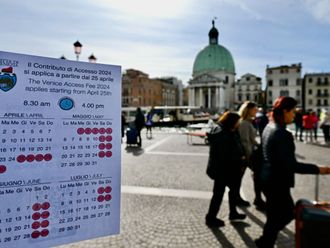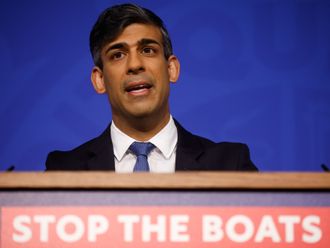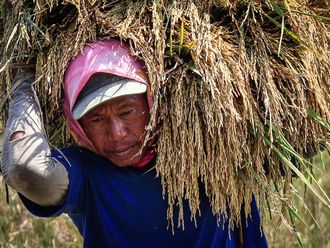Paris: A deadly shoot-out on the Champs Elysees, Paris’s most famous avenue, darkened the final day of campaigning in France’s pivotal presidential election on Friday, stoking fears of terrorist violence and causing candidates to suspend last-minute pitches before the Sunday vote.
As the candidates vowed to suspend campaign events to honour the fallen officer, analysts were quick to say that the shooting, in a country that has suffered a string of devastating terror attacks in the past two years, was particularly advantageous for the right-wing, anti-immigrant presidential contenders — especially Marine Le Pen, the leader of the National Front who has been sharply critical of “Islamist terrorism” for weeks.
Despite a promise not to campaign, Le Pen spoke on Friday morning, calling on the French government to immediately reinstate border checks and expel foreigners being monitored by the intelligence services.
“My government of national unity will implement this policy, so that the Republic will live, and that France will live,” she said in an impromptu press conference.
The attack was claimed, with unusual speed, by Daesh through its affiliated Amaq News Agency on Thursday night, saying it was carried out by a Belgian national it identified only by the pseudonym Abu Yousuf Al Baljiki.
But analysts urged caution in interpreting the information.
“It’s never happened in the past so quickly,” said Jean-Charles Brisard, an intelligence expert and the director of the Paris-based Center for the Analysis of Terrorism, referring to the Daesh tendency to claim attacks.
“Perhaps the individuals in question had some kind of coordination and were in contact with them,” he said, “but we should also not rule out the possibility that Amaq was too hasty in releasing its statements.”
On Friday, French police detained three family members of the dead gunman, the Reuters news agency reported, citing legal sources. Francois Molins, the Paris prosecutor, declined to disclose the gunman’s identity because of the ongoing investigation, which included the discovery of a number of knives and a pump-action shotgun.
European intelligence officials confirmed that the attacker was named Karim Cheurfi and was known to French intelligence, having previously come to authorities’ attention because of radical Islamist links.
The Associated Press described him as a 39-year-old with a criminal record.
According to Christophe Crpin, a spokesman for the UNSA Police Union, the gunman opened fire on the police with an AK-47 style assault rifle, targeting officers who were near a Marks & Spencer store on the corner of the busy avenue.
The attack is expected to weigh heavily on voters’ minds as they prepare to go to the polls on Sunday for the first round of the presidential election.
Franois Fillon, one of the presidential candidates, said in a statement that the election campaign should be suspended.
Emmanuel Macron, the popular independent candidate vying for the presidency, however, was quick to argue against any fearmongering.
“We must not yield to fear today,” he said on Thursday. “This is what our assailants are waiting for, and it’s their trap.”
Ahead of the first round of the vote on Sunday, Macron is leading Le Pen in the latest polls, but by only a small margin. After Thursday’s attack, both Fillon and Le Pen announced that they would cancel events planned for Friday, the last official day of campaigning.
The country has been hit by a deadly wave of terrorist violence in the past two years that has claimed the lives of at least 230 people and injured hundreds of others.
Thursday’s shooting — on the most famous boulevard in the French capital, always crowded with tourists and commuters — came just two days after authorities arrested two men in the southern city of Marseille on suspicion of plotting what Paris prosecutors described as an “imminent” and “violent” assault. Police discovered a Daesh flag and three kilograms of explosives in one suspect’s home.
Daesh has asserted responsibility for previous attacks in France, including a coordinated November 2015 terrorist assault on multiple targets in Paris that left 130 people dead and more than 360 wounded.
After that attack and others in the past two years — many perpetrated by Daesh militants or those claiming to be inspired by the extremist group — terrorism and national security have become crucial issues in the most contentious election France has seen in decades.
Le Pen, the far-right presidential candidate, has campaigned heavily on an anti-immigrant platform and what she has couched as the need to defend France from “Islamist globalisation.” In the final days of the campaign, she said she would halt immigration altogether if elected president.












